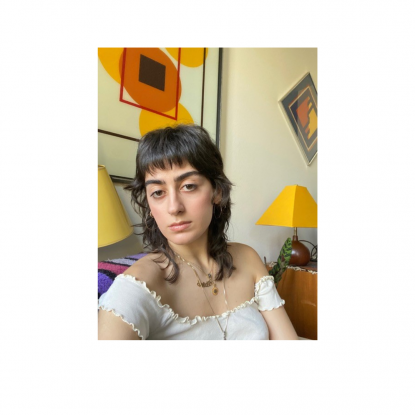Student Spotlight – Helya Salarvand
Meet third-year undergraduate researcher Helya Salarvand!
Helya Salarvand majors in Gender Studies and is in our Undergraduate Research Fellows Program (URFP). The title of her project is “(Re)Locating Pride: Borders, Space, and Policing at Los Angeles Pride.” She hopes that her project can support the rethinking and reshaping of Pride so that all Queer people can feel welcomed, safe, and celebrated. Her best piece of advice to hit the ground running!
How did you first get interested in your research project?
The initial seeds of my interest in research regarding Pride were planted during my attendance of several Pride events in Los Angeles, San Francisco, and New York. I was mesmerized by the scale of these celebrations of Queer love, joy, survival, and resistance. That mesmerization was also coupled with a subtle sense of disconnectedness which only grew as I got older and mended my lesbian identity with my Iranian identity and radical politics. I was compelled to examine why I felt disconnected from mainstream Queer spaces and that is a small bite of what my research is trying to chew off.
What has been the most exciting aspect of your research so far?
The most exciting aspect of my research has been learning about Queer history. Though my research ultimately maps the evolution of Pride and LGBT liberation from its radical, anti-capitalist, anti-police origins towards neoliberal, homonationalist, and homonormative ideals, I found myself really intrigued and touched by these Queer histories. I’m also excited by indications that there is a genuine interest in the Queer community now to shift back to the radicalism which ignited the movement, signified by boycotts of Pride events sponsored by mammoth corporations and military entities. Last year’s LA Pride was conceptually relocated as an All Black Lives Matter March (which also received intense criticism due to their initial invitation of police) so it’s exciting examining the greater impacts of that conceptual relocation too.
What has surprised you about your research or the research process?
There are a few discoveries in my research that took me aback, the first being that police have never been absent from Pride. Though Pride is a commemoration of the Stonewall Riots, the most notorious successful violent uprising by Queer and Trans people against police, the first Los Angeles Pride (which occurred on the one year anniversary of Stonewall) required police “protection”. Though police were reluctant to extend their labor, the official permitting of Pride required their presence at the event. Something else that surprised me was learning about the Alpine project or “Stonewall Nation” which was literally an attempt at Queer settler-colonialism in California. This project sought to establish a gay separatist community in Alpine County and it would’ve entailed a relatively small group of Queer people moving to the rural county (which had a population of 430, 367 of them unregistered voters), recalling the county government, and replacing it with an all-gay party.
What is one piece of advice you have for other UCLA students thinking about doing research?
Hit the ground running! As a transfer student I felt at a disadvantage not having established rapport with any professors at the university yet. Once you have your research proposal, send that and a bit of information about yourself to any professor you might be interested in working with. Having a healthy relationship with your mentor is the most important part of this process so don’t settle on a professor you don’t vibe with!
What effect do you hope your research has in your field, at UCLA, in your community, or in the world?
The aim of my research is to highlight the harm that is done by the exclusivity of Queer spaces (namely LA Pride). I want to suggest that Pride as we currently know it does not serve our community but aids in the corporatization and militarization of the Queer identity. I hope that my research can support the rethinking and reshaping of Pride so that all Queer people can feel welcomed, safe, and celebrated regardless of religion, race, ethnicity, ability, class, or gender-identity. Our spaces need to prioritize Queer people rather than corporate interests, police or profit.




